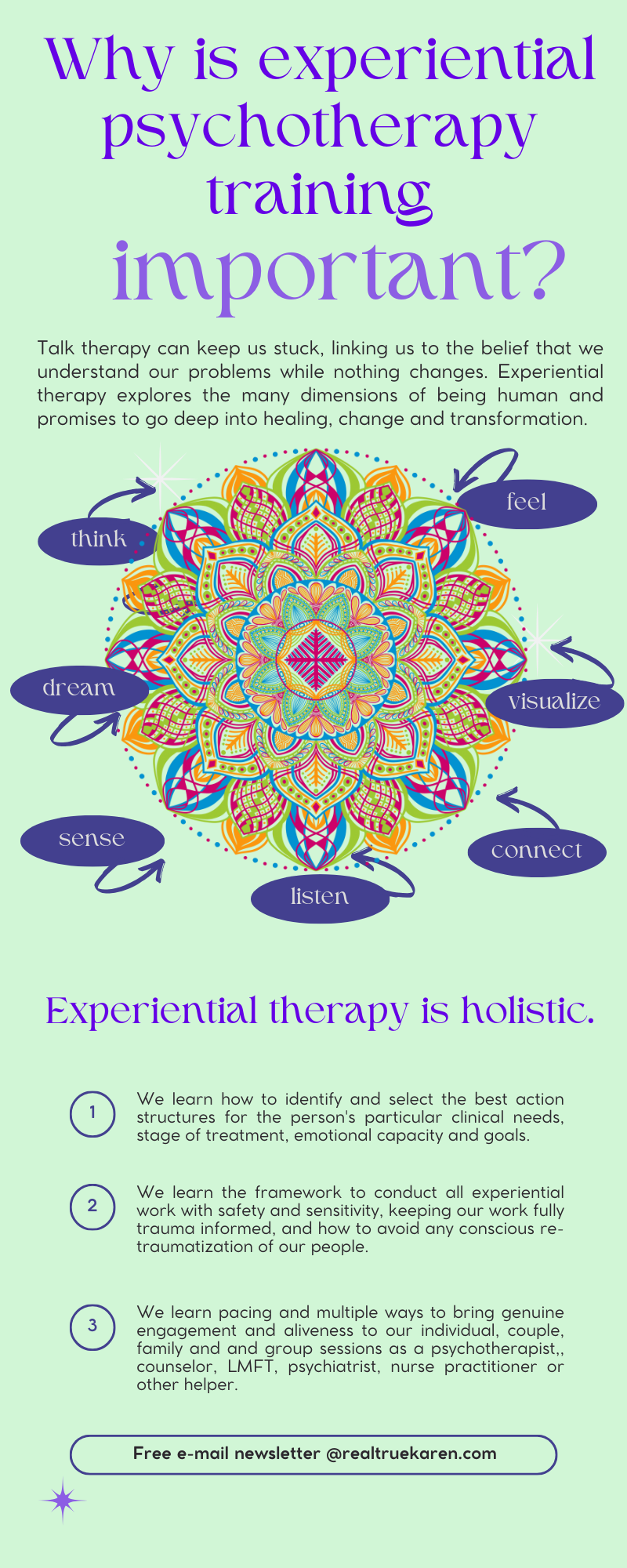|
By Karen Carnabucci, LCSW, TEP Experiential psychotherapy is based on the notion that a person cannot make a significant change until a shift happens within the experience of the person. The therapist who is practicing experiential therapy focuses on facilitating the transforming experience with the collaboration of the person -- the one we usually call the client although I continue to insist that the word "client" is too sterile and too mundane to describe this kind of experience. As the person gives themselves to the experience, of how it has been and how it is now, chance occurs in the therapeutic session. experience the difference from how it was before, and how it is now. Most psychotherapists do experiential therapy to some degree, in that what our people experience in the here-and-now therapeutic relationship makes a significant difference in their world. Those professionals who provide a consistent and caring presence, speaking directly and yet compassionately, acting with warm empathy, listening and validating definitely provide an important experience to the people they work with. However, when it comes to an actual "experiential" therapeutic modality, there is a wide spectrum of what is “experiential” and how to present these modalities on their own and incorporate with traditional talk therapy. The most experiential of the modalities has long been agreed to be psychodrama, the improvisational acting method that was originated by European-born Dr. J.L. Moreno as his defiant answer to the sedentary psychoanalysis of Freud. There is Gestalt, a derivative of psychodrama as adapted by Fritz Perls -- an early student of Moreno -- and the early fields known as Bioenergetics and Transactional Analysis. There are the creative arts therapies, such as music therapy, drama therapy, art therapy, and dance and movement therapy -- as well as therapies that include horses, for equine therapy, and modalities like horticulture therapy and poetry therapy. In the past couple of decades, increasing numbers of alternative healing methods have been emerging, from bodywork and energy work modalities like cranial sacral therapy, Reiki, tapping and Alchemical Alignment to Brainspotting and Somatic Experiencing to Family and Systemic Constellations. Of course, this is not a complete list. In fact, we do not seem to lack new modalities popping up regularly, particularly as neurobiologists tells us that the experiences change the brain, sometimes more effectively than medication. Bessel van der Kolk's near-classic book The Body Keeps the Score has done much to acquaint professionals and others the value of experiential psychotherapies, particularly in the treatment of trauma. Although it isn't easy to fit these varied therapies into rigid containers, there are several commonalities regarding the healing nature of experience:
About Karen
Karen Carnabucci, LCSW, TEP, is a nationally board-certified practitioner of psychodrama, sociometry and group psychotherapy, author of several books on experiential psychotherapies and the founder and director of the Lancaster School of Psychodrama and Experiential Psychotherapies in Lancaster, Pa. You may subscribe to Karen's e-letter here.
0 Comments
Your comment will be posted after it is approved.
Leave a Reply. |
AuthorKaren Carnabucci, LCSW, TEP, is an author, trainer and psychotherapist who promotes, practices and teaches experiential methods including psychodrama, Family and Systemic Constellations, sand tray, mindfulness and Tarot imagery. Archives
December 2023
Categories
All
|

 RSS Feed
RSS Feed